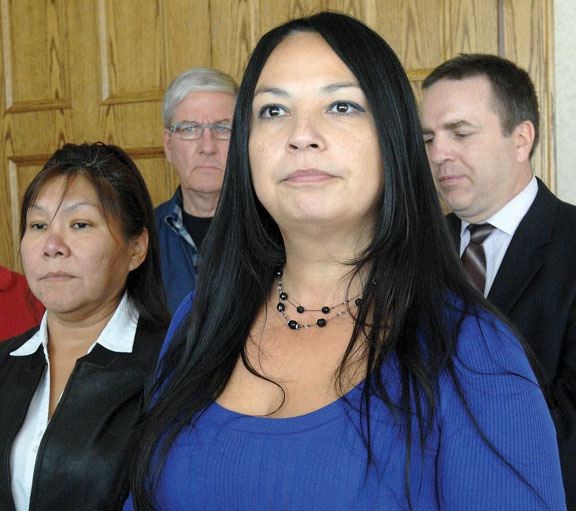The national inquiry into murdered and missing women will need to narrow its scope and build on existing recommendations from numerous past reports if it will have impact, local family advocates say.
"In this national inquiry (the question is) is how do we ensure that the next steps are going to be taken in a strong, thoughtful manner because we have to figure out how we're going to implement this and we need to look at developing on an accountability framework," said Mary Teegee by phone after the Wednesday morning announcement of $53.8 million over two years and five commissioners, led by a B.C. judge, to oversee the inquiry.
To represent the north, Teegee and Brenda Wilson John of Carrier Sekani Family Services, the host agency for the Highway of Tears Initiative, flew to Vancouver for the announcement.
Both stressed the need to pull from past reports - including the Missing Women Commission of Inquiry, overseen by Wally Oppal and the decade-old Highway of Tears Symposium Report - and questioned why so many of the recommendations have yet to be implemented. While they praised the inquiry's focus on systemic issues that lead to the national tragedy, they questioned whether it could fulfill such a broad mandate on the current budget.
"We need to put it in that context," said Teegee. "It's actually a broader problem ... the impacts of colonization and residential schools and to not look at missing and murdered indigenous women without looking at systemic issues, we would be remiss in our duties."
A relaxed and culturally sensitive approach to consultation will be an improvement on the "regimented" approach of the Oppal report, Teegee said. That recommendation came from pre-inquiry meetings held in 16 spots, including Prince George. She was also pleased to hear counselling would be offered to families.
It was an emotional day for Wilson John, who in June completed a 700-kilometre trek from Prince Rupert to Prince George in an effort to cleanse Highway 16, known as the Highway of Tears along that stretch.
"I could see the whole highway," said Wilson John, whose 16-year-old sister Ramona Wilson went missing near Smithers in 1994. Her body was found almost a year later. "It was amazing because all I could hear was the families, all their voices, all their recommendations."
Both the province and federal governments stressed the goals of the inquiry were to look at the patterns and underlying factors that lead to higher levels of violent outcomes for indigenous women.
"While British Columbia's Oppal Inquiry looked at specific cases of missing and murdered women in the Downtown Eastside and along the Highway of Tears, the national inquiry will take a new approach, focusing on the underlying root causes and systemic issues that increase the vulnerability of Indigenous women and girls," said Attorney General and Minister of Justice Suzanne Anton in a statement.
Teegee said the group would be meeting with Anton Wednesday afternoon as the province has an important role to play.
"You can't (look at) systemic issues without including the child welfare system in B.C. - and that's provincial jurisdiction - and policing," she said. "Definitely all of those barriers and challenges that our families have faced, many of it comes from the province so they have to be integral to this inquiry but they're also fundamental to the solutions that are coming out of the inquiry."
Indigenous Affairs Minister Carolyn Bennett said in a January interview the inquiry needs to go to rural and isolated communities.
Teegee said it's absolutely necessary the commissioners visit those affected communities.
"They have to come to the north," said Teegee, where many of the women who end up in urban centres or the Downtown Eastside are originally from. "We're going to make sure, trust me."
"(I)t will be up to the Commissioners to decide how, when and where to hear from witnesses, including survivors, families and loved ones," said an email statement from Indigenous and Northern Affairs Canada, adding the commission will establish a website in the next few weeks. The inquiry is scheduled to begin on Sept. 1.
Before then, Teegee and others have work to do. That includes reaching out to Grand Chief Stewart Phillip and setting up a meeting to create an advisory group.
"We want to make sure whatever we're doing in the region helps the national inquiry in the best way possible."
While the commitment felt like a step forward, Teegee said the day had a mixed meaning for many.
"It's a happy day but it's a sad day. After all these years where all the voices of missing and murdered were not being brought forward, that finally there is a validation that our lives matter but it's sad that it had to come to this."
- with files from Mark Nielsen and The Canadian Press


.png;w=120;h=120;mode=crop)
